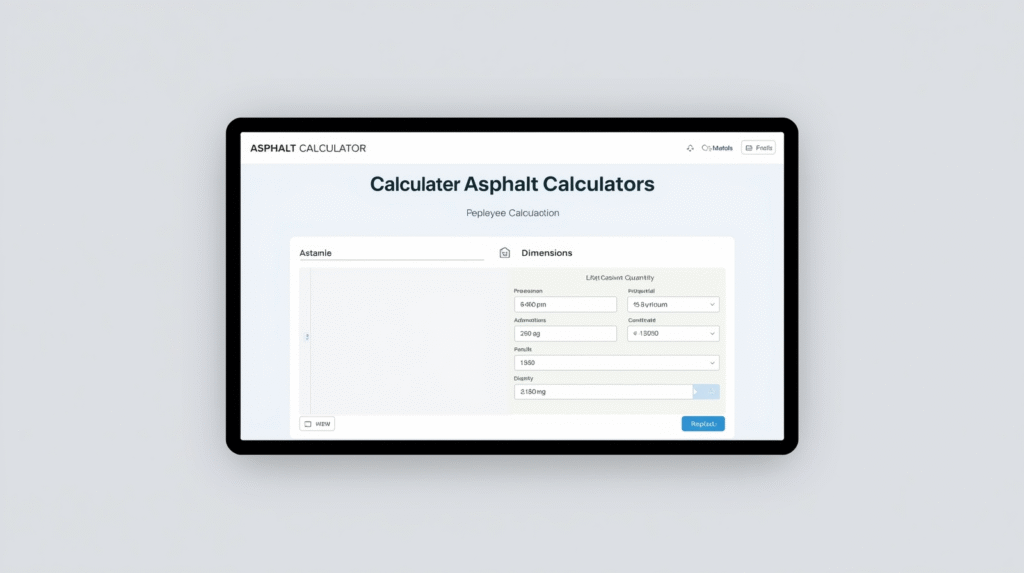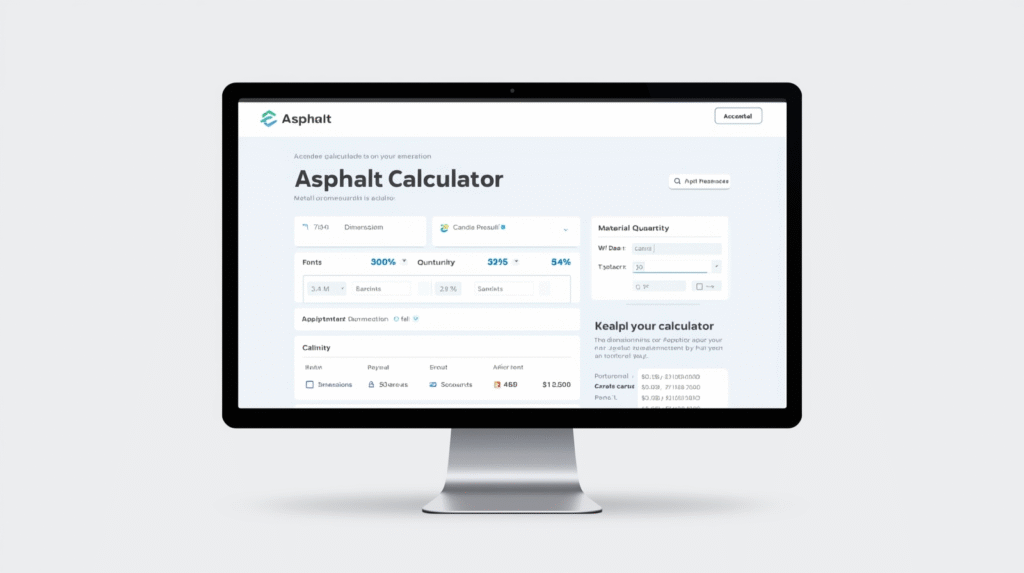Have you ever looked at your driveway or parking lot and wondered how much asphalt you’d actually need to cover it? You’re not alone. Figuring that out can be confusing. That’s where an asphalt calculator comes in. It’s a simple tool that takes away the guesswork and helps you plan your project with confidence.
Whether you’re a homeowner fixing a driveway, a contractor paving a road, or a DIY fan working on a small path, understanding how much asphalt you need is key to saving time and money. In this guide, we’ll walk you through everything you need to know about using an asphalt calculator — from how it works to why it matters — all in easy, plain language.
What Is an Asphalt Calculator?

An asphalt calculator is an online or mobile tool that helps you estimate how much asphalt mix you need for a specific area. You simply enter the length, width, and thickness of your project, and the calculator tells you how many tons or cubic yards of asphalt you’ll need.
It’s like having a math expert built right into your phone or computer. No more confusing formulas, guessing, or overbuying materials. The calculator does the math instantly and accurately so you can focus on getting the job done right.
Most calculators are free to use and only take seconds to give you results. This makes them perfect for contractors and homeowners alike.
Why You Should Use an Asphalt Calculator
Using an asphalt calculator isn’t just about convenience — it’s about smart planning. Here’s why it’s so useful:
- Saves Money: Ordering too much asphalt means wasted money. Too little means project delays. The calculator gives you just the right amount.
- Prevents Waste: Asphalt hardens quickly, and leftover mix can’t be reused easily.
- Helps Budgeting: Knowing your exact material needs helps you plan the cost of labor, transportation, and supplies.
- Saves Time: You can make decisions faster and avoid back-and-forth with suppliers.
In short, it helps you avoid costly surprises and keeps your paving project on track.
How an Asphalt Calculator Works

Most asphalt calculators use a simple formula based on area and thickness. Here’s how it breaks down:
- Measure the Length and Width of your project in feet.
- Choose the Thickness of the asphalt layer (usually between 2 to 4 inches for driveways).
- The calculator converts the volume into tons or cubic yards of asphalt.
Here’s a simple example:
Let’s say your driveway is 20 feet wide, 40 feet long, and you want 3 inches of asphalt. You plug those numbers into the asphalt calculator, and it tells you how many tons you need — usually around 7 to 8 tons.
Pretty neat, right? You get accurate results in seconds without a single calculator or spreadsheet.
The Basic Asphalt Formula Explained
If you’re curious how it all works behind the scenes, here’s the basic formula most calculators use:
Volume (in cubic feet) = Length × Width × Thickness
Asphalt Weight (in tons) = Volume × Density
The average density of asphalt is about 145 pounds per cubic foot, which equals 0.0725 tons per cubic foot. So if your project has a total volume of 100 cubic feet, you’ll need about 7.25 tons of asphalt.
Even if math isn’t your thing, that’s all you need to know — and that’s exactly what the asphalt calculator does for you automatically.
Types of Asphalt Projects That Need a Calculator
An asphalt calculator is useful for many types of projects, big or small. Here are some common ones:
- Residential Driveways – Perfect for figuring out how much asphalt you’ll need for your home’s driveway.
- Parking Lots – Large-scale jobs benefit from accurate estimates to stay within budget.
- Road Construction – Every inch of road needs precise planning and material estimation.
- Pathways and Walkways – Even small paths need accuracy to avoid waste.
- Basketball Courts or Play Areas – Custom-sized areas can be easily calculated for perfect coverage.
No matter what project you’re planning, an asphalt calculator makes your job simpler and more accurate.
How to Measure Your Project Area Correctly
To get accurate results, you’ll need correct measurements. Here’s how to do it:
- Measure the Length and Width using a measuring tape or laser tool.
- Convert Inches to Feet: If you measured in inches, divide by 12 to get feet.
- Choose the Right Thickness: Driveways usually need 2–3 inches. Parking lots or roads may need 4–6 inches.
- Enter the Numbers: Plug your figures into the asphalt calculator and click “calculate.”
That’s it! You’ll instantly know the amount of asphalt required for your project.
Tips for Using an Asphalt Calculator Accurately
Even though the tool is simple, a few tips can help you get even more precise results:
- Double-check measurements. Small errors can make a big difference.
- Account for extra space. Add 5–10% to your total for edges and uneven ground.
- Use consistent units. Make sure you enter all dimensions in feet or meters — not a mix.
- Know your mix type. Some mixes are denser and may change the final amount slightly.
Following these tips ensures your asphalt calculator results are spot on.
Factors That Affect Asphalt Quantity
While an asphalt calculator gives great estimates, some factors can affect how much you actually need:
- Surface condition: Rough or uneven ground requires more material.
- Compaction rate: Asphalt compresses as it’s rolled, reducing the final thickness.
- Temperature: Hot weather can make asphalt expand slightly.
- Mix type: Different asphalt mixes have unique densities.
These are small differences, but being aware of them can help you plan more accurately.
Cost Estimation: How Much Will It All Cost?
An asphalt calculator can help you estimate not only the material amount but also the cost.
On average, asphalt costs between $90 and $150 per ton, depending on the region and mix type. Once you know how many tons you need, multiply it by the price per ton to get an estimate.
For example, if your driveway needs 8 tons and the cost is $120 per ton, the total asphalt cost is about $960 — before labor or equipment.
Using an asphalt calculator gives you a solid starting point for budgeting your entire project.
Best Free Asphalt Calculators Online
Here are a few reliable asphalt calculators you can try today:
- Inch Calculator Asphalt Estimator – Very user-friendly and accurate.
- Calculator.net Asphalt Calculator – Provides quick ton and yard conversions.
- MeasureSquare Paving Estimator – Great for contractors who handle multiple jobs.
- Asphalt Kingdom Calculator – Designed for driveway and parking lot projects.
These tools are free, accurate, and mobile-friendly, so you can use them on-site or at home.
Common Mistakes to Avoid When Using an Asphalt Calculator
Even with a calculator, mistakes can happen. Avoid these common ones:
- Ignoring compaction: Asphalt compresses by 10–15% after rolling.
- Measuring irregular shapes wrong: Break the area into smaller rectangles or circles for better accuracy.
- Forgetting about waste: Always add a small buffer (5–10%).
- Using inconsistent units: Mixing feet, meters, and inches causes errors.
If you keep these in mind, your asphalt calculator results will be much more reliable.
Real-Life Example: Driveway Project
Let’s look at a real example.
Mike wants to repave his 25×50-foot driveway with 3 inches of asphalt. Using an asphalt calculator, he enters:
- Length: 25 ft
- Width: 50 ft
- Thickness: 3 in (0.25 ft)
The calculator shows he needs about 14,000 pounds (7 tons) of asphalt. Mike orders 7.5 tons to be safe and finishes the job perfectly — no waste, no shortage.
That’s the power of using an asphalt calculator before you start a project.
Environmental Benefits of Accurate Asphalt Estimation
Accurate calculations aren’t just good for your wallet — they’re good for the planet. By using an asphalt calculator, you reduce waste, minimize leftover materials, and avoid unnecessary truck trips.
Less waste means fewer emissions and a smaller environmental footprint. Many contractors now use calculators as part of their sustainable construction practices.
FAQs About Asphalt Calculators
1. What is an asphalt calculator used for?
It helps you estimate how much asphalt mix you need for a specific area based on length, width, and thickness.
2. How accurate is an asphalt calculator?
It’s very accurate for most projects, as long as your measurements are correct and you account for compaction.
3. Can I use an asphalt calculator for small DIY projects?
Absolutely! It works great for driveways, small paths, and home projects.
4. Do I need to know asphalt density?
Not really — most calculators already include average density in their formula.
5. How much asphalt do I need for a 2-car driveway?
A typical 2-car driveway (20×40 feet, 3 inches thick) needs around 7–8 tons of asphalt.
6. Can I reuse leftover asphalt?
Not easily. Asphalt hardens quickly, so accurate calculation helps prevent leftover waste.
Conclusion: Plan Smart, Pave Smart
Using an asphalt calculator may seem simple, but it’s one of the smartest steps in any paving project. It helps you plan better, avoid costly mistakes, and stay within your budget. Whether you’re paving a small driveway or a massive parking lot, it gives you confidence and control.
Next time you start a paving project, open your favorite asphalt calculator first. You’ll save time, money, and stress — and your finished surface will look perfect.




